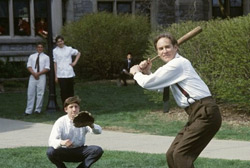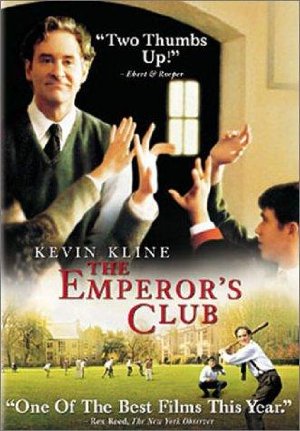The Emperor's Club Review
By Norm Schrager

It's the mid-1970s at a proper boys' prep school in DC, and Kline's Hundert encounters his first splash in the face with the cold water of life outside revered academia when he meets the father of a mischievous underachieving student. The stern dad, a brash U.S. senator, scolds Hundert: "You will not mold my son, I will mold my son". With a dose more sympathy for the kid, Hundert befriends him and watches him turn into a studying machine.
The academic transformation of young Sedgewick Bell (an uncomfortable-looking Emile Hirsch, The Dangerous Lives of Altar Boys) is one of the weaker points of the film, coming across with minimal development and questionable motivation. But Hoffman keeps the talky action moving, and there's a greater good involved, a satisfaction in seeing Bell take part in his classmates' insatiable hunger to soak up facts in the hopes of making the final round of a ridiculous old contest known as Mr. Julius Caesar (some traditions just ain't worth keeping).
Throughout The Emperor's Club there's an overriding theme that says there's a big gap between understanding the history of civilization and actually being civilized. The humble Mr. Hundert, who Kline expertly portrays with a finely tuned combination of pride, formality, and snobbish stiffness, finds his ego along the way. He is so impressed with the progress of his formerly troublesome charge that he secretly bends the rules for him. It's a slightly immoral move that Hundert regrets when he finds that Sedgewick has some rule-bending ideas of his own.
Neil Tolkin's script, based upon a short story by Ethan Canin, has some gentle twists, both large and small, with the final third of the film surprisingly taking place some 20 years later. It all works though, as the story's winding path continues to support its main, bigger picture themes. When Kline's Hundert meets his former students as adults, he finds even more lessons in store, in a world where men of power get off on the lust of competition just as much as when they were teens.
But The Emperor's Club is not wholly cynical. Kline portrays Hundert with such passion, hopefulness, and hunger, it's hard not to enjoy and appreciate his life's work in this feature that feels a bit like Dead Poets Society minus the histrionics. Kline's steady presence, Hoffman's eager direction and some fine supporting performances combine to help provide intertwined thrills -- one that comes in watching a film that embraces education and dignity, and one that favors politeness and knowledge in this chaotic, and often rude, world.
Reviewed at the 2002 Boston Film Festival.
The emperor's ball club.

Facts and Figures
Year: 2002
Run time: 109 mins
In Theaters: Friday 22nd November 2002
Box Office USA: $14.0M
Distributed by: Universal Pictures
Production compaines: Universal Pictures
Reviews
Contactmusic.com: 4 / 5
Rotten Tomatoes: 50%
Fresh: 64 Rotten: 63
IMDB: 6.9 / 10
Cast & Crew
Director: Michael Hoffman
Producer: Marc Abraham, Andy Karsch
Screenwriter: Neil Tolkin
Starring: Kevin Kline as William Hundert, Emile Hirsch as Sedgewick Bell, Embeth Davidtz as Elizabeth, Rob Morrow as James Ellerby
Also starring: Joel Gretsch, Steven Culp, Patrick Dempsey, Harris Yulin, Paul Dano, Jesse Eisenberg, Rishi Mehta, Marc Abraham, Andy Karsch, Neil Tolkin














